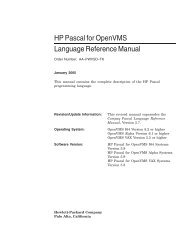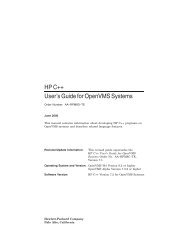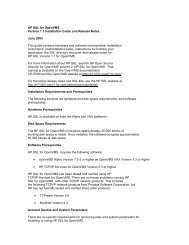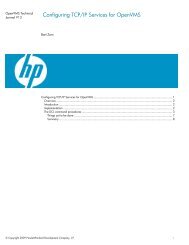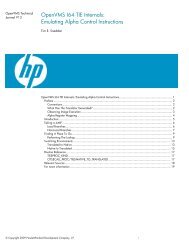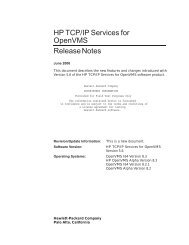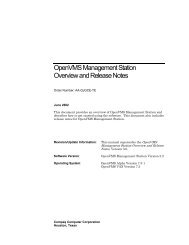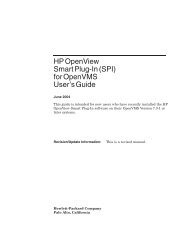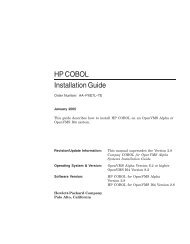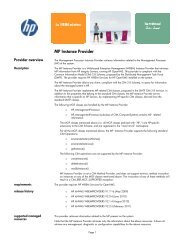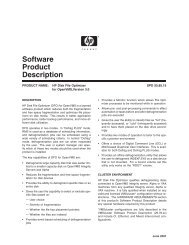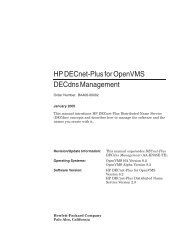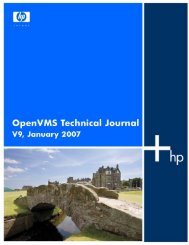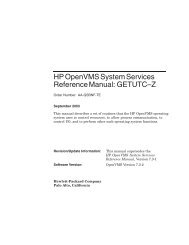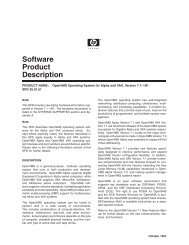HP Archive Backup System for OpenVMS Guide to Operations
HP Archive Backup System for OpenVMS Guide to Operations
HP Archive Backup System for OpenVMS Guide to Operations
You also want an ePaper? Increase the reach of your titles
YUMPU automatically turns print PDFs into web optimized ePapers that Google loves.
Media Management<br />
4.2 Domain<br />
4.2.1 ABS Rights<br />
4.2.2 Application Rights<br />
4.2.3 Check Access<br />
4.2.4 Deallocate State<br />
4.2.5 Default Rights<br />
4.2.6 Mail Users<br />
The domain attribute ABS_RIGHTS controls whether a user having certain pre-V4.0 ABS rights<br />
can map these <strong>to</strong> MDMS rights <strong>for</strong> security purposes (see Chapter 5, Security <strong>for</strong> more in<strong>for</strong>mation<br />
about rights). Setting the attribute allows the mapping, and setting the attribute <strong>to</strong> false disallows<br />
the mapping.<br />
The right MDMS_APPLICATION_RIGHTS is a high-level right that maps <strong>to</strong> a set of low level<br />
rights suitable <strong>for</strong> MDMS applications (<strong>for</strong> example, ABS and HSM). Normally these rights<br />
should not be changed, or at least not reduced from the default settings otherwise ABS and HSM<br />
may not function correctly. You may add rights <strong>to</strong> application rights if you have your own<br />
MDMS applications or command procedures. The ABS and MDMS$SERVER accounts should<br />
have MDMS_APPLICATION_RIGHTS granted in the User Authorization File.<br />
The check access attribute determines if access controls are checked in the domain. MDMS uses<br />
two <strong>for</strong>ms of security: Rights and Access Control. Rights checking is a task-oriented <strong>for</strong>m of<br />
security and is always per<strong>for</strong>med. However, access control is an object-oriented <strong>for</strong>m of security<br />
and can be optionally enabled or disabled with this attribute. Setting Check Access enables<br />
access control checking. Clearing Check Access disables access control checking even if there<br />
are objects with access control entries.<br />
When a volume is deallocated after its data has expired, it may go in<strong>to</strong> one of two states. The<br />
transition state is an interim state that the volume goes in<strong>to</strong> after deallocation, but it is not eligible<br />
<strong>to</strong> be used again until a period of time called the transition time expires. This is a safety feature<br />
that allows you <strong>to</strong> examine whether the data has legitimately expired, and if not <strong>to</strong> retain the<br />
volume (put back <strong>to</strong> the allocated state). If you do not wish this feature, you can disable the transition<br />
state and allow volume <strong>to</strong> return directly <strong>to</strong> the free state, where it is eligible <strong>for</strong> immediate<br />
allocation and initialization <strong>for</strong> new data. The domain deallocate state is applied <strong>to</strong> all volumes<br />
that are au<strong>to</strong>matically deallocated by MDMS. When manually deallocating volumes, you can<br />
override the domain deallocate state with a state on the deallocate operation itself.<br />
The MDMS default rights attribute maps a set of MDMS low-level rights <strong>to</strong> all users in the<br />
domain. This allows you <strong>to</strong> give all users a limited set of rights <strong>to</strong> access MDMS objects and per<strong>for</strong>m<br />
operations, without having <strong>to</strong> expressly modify their accounts. Be aware that default rights<br />
are applied <strong>to</strong> all users on all nodes in the domain, so granting such rights should be carefully<br />
reviewed. By default, MDMS maps no rights <strong>to</strong> the default rights.<br />
When MDMS deallocates volumes based on their scratch date (an operation that is per<strong>for</strong>med<br />
once per day), it sends a mail message indicating which volumes were deallocated <strong>to</strong> the set of<br />
users defined in the mail users attributes. You should enter a list of users in the <strong>for</strong>mat<br />
node::username. Every user in the list will receive the deallocate volume mail messages. This<br />
mail address is also used when the ABS catalog unpack process encounters an error.<br />
4-2 Media Management



